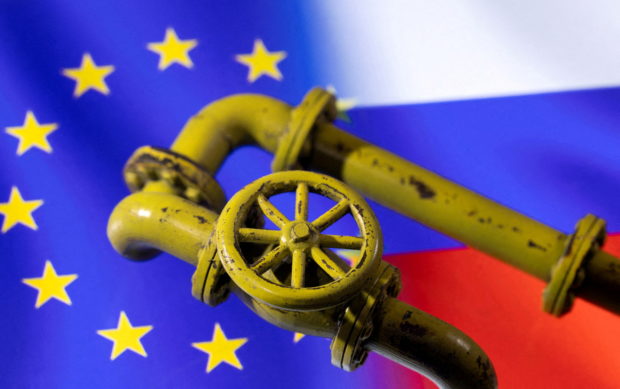
FILE PHOTO: A 3D printed Natural Gas Pipes are placed on displayed EU and Russian flags in this illustration taken, January 31, 2022. REUTERS/Dado Ruvic
BRUSSELS — Payment for Russian gas in roubles by European Union buyers as demanded by President Vladimir Putin would break the EU’s sanctions regime against Moscow, an internal European Commission note said.
Putin has warned Europe it risks having gas supplies cut unless it pays in the Russian currency as he seeks retaliation over Western sanctions for Moscow’s invasion of Ukraine.
The European Commission’s note, making clear it is technical, preliminary, and based on an unofficial translation of the Russian Presidential Decree of March 31, said the law added several new layers of obligations on EU gas buyers, taking the effective completion of the purchase out of their hands.
“This mechanism would lead to a breach of the existing EU restrictive measures adopted in respect of Russia, its government, the Central Bank of Russia, and their proxies,” the internal note, seen by Reuters, said.
The government of the Netherlands will instruct companies not to pay for Russian gas in roubles, a Ministry of Economic Affairs spokesperson said on Thursday, citing the decision by the European Commission.
Putin’s decree imposed an obligation on EU gas buyers to open at least two special accounts — one for euros or dollars and one for roubles — with Gazprombank and channel all gas payments through the bank.
The EU buyer would still pay Gazprombank in the contract currency — euros or dollars — but the purchase would only be complete once Gazprombank exchanges the currency into roubles in a deal with the Russian central bank, and deposits the roubles in the second account, the note said.
“The effect…is that a payment is completed not in the currency established under the contract at the moment it is deposited in the accounts…but rather only at an unknown and undefined moment once the foreign currency…is converted into roubles and credited to the second special account,” the Commission note said.
It noted that the process would be entirely overseen by Russia, depriving European companies of control of the funds from the moment of payment and introducing unpredictable additional costs.
“The Russian State, through its central bank, has total control over the foreign currency…which it can manipulate entirely to its own benefit,” the note said, pointing to, for example, the applied exchange rate.
RELATED STORY:
EU readying new Russia sanctions, may retaliate over rouble payments for gas – sources